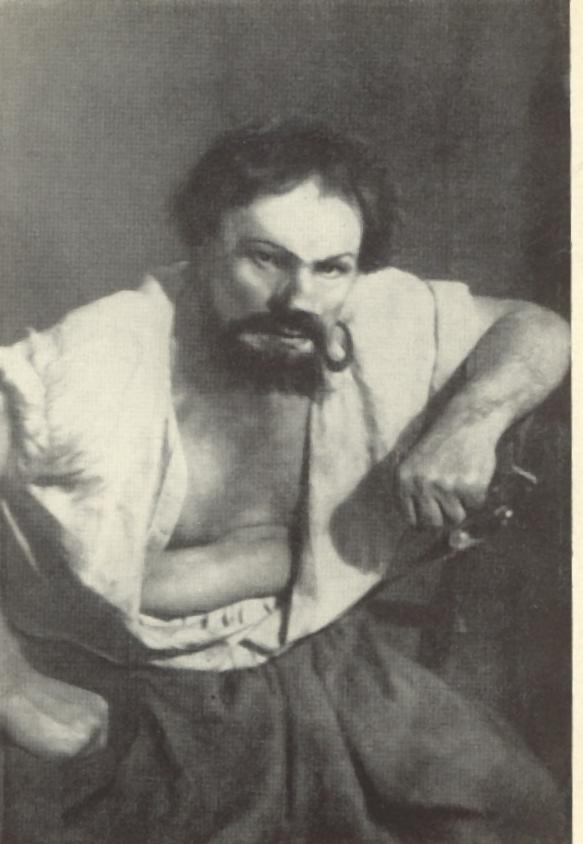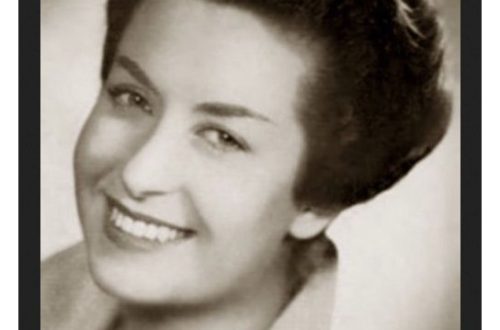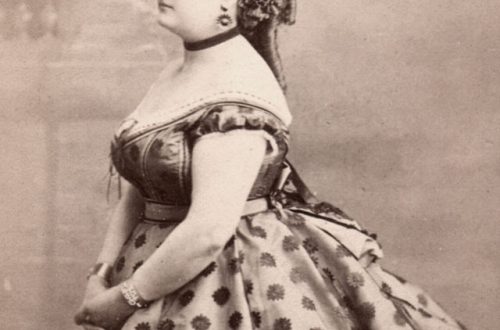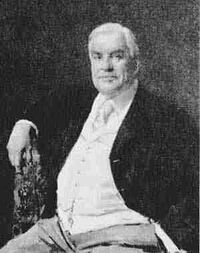
Ivan Vasilyevich Ershov |
Ivan Ershov
“If Sobinov was the most perfect of Russian lyric tenors, then among the performers of heroic-dramatic tenor parties, the same place belonged to Ershov,” writes D.N. Lebedev. – The largest representative of the realistic vocal school, Ershov resolutely and vividly asserted its principles.
Ershov’s work was hot, exuberant, passionately captivating. As he was in life, so he was in performance. The power of persuasiveness, simplicity were an integral part of his artistic nature.
No wonder one of his contemporaries called him Chaliapin among tenors.
Ivan Vasilyevich Ershov was born on November 20, 1867. “My childhood was difficult,” Ershov recalled. – I was in the family “extra mouth”. My mother worked as a servant in a family of impoverished landowners. I was going to be a railroad engineer. He has already passed the exams for the title of assistant driver and has repeatedly traveled to the line, driving a steam locomotive. But the great Anton Rubinstein drew attention to me, a young man. Since then, my life has been dedicated to art, music.”
Yes, as it happens, a case helped him. Ershov studied at the railway school in Yelets, often performed in amateur concerts. His extraordinary abilities were undeniable. Here he was heard by the professor of the St. Petersburg Conservatory N.B. Pansh. She told A.G. Rubinstein about a talented young man. On the recommendation of the great pianist, yesterday’s machinist became a student of the vocal class, led by Stanislav Ivanovich Gabel. The years of study were not easy: all income was 15 rubles a month, scholarships and a free lunch.
In 1893 Ershov graduated from the St. Petersburg Conservatory. In the same year he made his debut as Faust.
“The young singer did not make a favorable impression,” writes A.A. Gozenpud. He was advised to go to Italy for improvement. After four months of classes with the teacher Rossi, he made his debut with great success at the Regio Opera House. A new success brought him the performance of the role of José in Carmen. The rumor about Yershov’s foreign performances reached Napravnik and Vsevolozhsky, and the artist was offered a new debut. Characteristically, this happened after he gained fame abroad. It is unlikely that 4 months of classes with Rossi could significantly enrich his vocal culture. Returning to Russia, Ershov performed in Kharkov in the 1894/95 season. The debut at the Mariinsky Theater took place in April 1895 as Faust.
This performance was also notable for the fact that another debutant, the young bass Fyodor Chaliapin, performed as Mephistopheles. In the future, as you know, Chaliapin sang on almost all the major stages in the world, and Ershov’s entire creative life was practically limited to the Mariinsky (later Kirov) Theater.
At first, Ershov sang a variety of tenor parts here, but over time it became clear that his real vocation was heroic roles. It was on this path that his outstanding abilities were revealed not just as a singer, but as a singer-actor. Outlining his artistic credo, Ershov wrote:
“The voice of the singer is the voice of the heart. The word, facial expressions, modulation of the human figure in the costume of the era, in the costume of the nationality and its class affiliation; his years, his character, his attitude to the environment, etc. etc. – all this requires from the singer-actor an appropriate feeling for the corresponding color of the sound of his voice, otherwise everything is bel canto and bel canto, etc. etc. Realism, truth in art!..
How many changes in timbres, colors, all kinds of vocal twists and turns can be in the voice, but there is no truth, feelings of the heart and spirit!
Faust and Romeo did not correspond in any way to the personality of the artist. Tannhäuser and Orestes brought real success to Ershov. Thanks to them, the stage talent of the young singer was revealed and the strength and expressiveness of the voice were manifested.
The critic Kondratiev notes with satisfaction Ershov’s performance in Oresteia: “Ershov made a good impression… the part was written godlessly strong and lofty, and he came out of this test with honor.” After the second performance: “Ershov made a sensation in the fury scene.”
Another creative victory for Ershov was his performance in the opera Samson and Delilah. About him, Kondratiev wrote: “Ershov perfectly performed Samson.” He won new success in the part of Sobinin, singing the usually missed aria with the choir “Brothers, in a snowstorm.” It contains several times the upper “C” and “D-flat”, accessible to few tenors. Almost all the representatives of musical St. Petersburg came to this performance, and Figner followed the clavier to see if the singer would allow any deviations from the original.
Kondratiev noted in his diary: “The aria is written in such an unusual high register that it terrifies even when reading it. I was afraid for Yershov, but he came out of this test with honor. Especially subtly he performed the middle part of the cantabile, the audience deafeningly called him and demanded a repetition, he fulfilled the demand of the public and sang calmer and even better for the second time.
Ershov also recreated the image of Finn in Ruslan and Lyudmila in a completely new way. B.V. wrote about this. Asafiev: “Performance is a living creativity, visibly tangible, because the “voiced word”, in the refraction that Yershov gets, acts as a link in the continuous (in this sound sphere) flow of the process of shaping every moment, every spiritual movement. Both scary and joyful. It’s scary because among the many people involved in opera as an art, very, very few are destined to comprehend the full depth and power of expression inherent in it. It is joyful because, listening to Yershov’s performance, in an instant you can feel something that is not revealed in any treatises and that cannot be conveyed by any description: the beauty of the beating of life in the manifestation of emotional tension through musical sound, meaningful by the word.
If you look at the list of opera parts performed by Ershov, then he, like any great artist, is marked by both richness and diversity. The widest panorama – from Mozart, Weber, Beethoven and Bellini to Rachmaninoff, Richard Strauss and Prokofiev. He had excellent achievements in the operas of Glinka and Tchaikovsky, Dargomyzhsky and Rubinstein, Verdi and Bizet.
However, a monument in the history of opera art was erected by the Russian singer to himself with two peaks. One of them is the magnificent performance of parts in Wagner’s works. Ershov was equally convincing in Lohengrin and Tannhäuser, Valkyrie and Rhine Gold, Tristan and Isolde and The Death of the Gods. Here the singer found a particularly complex and rewarding material for embodying his artistic principles. “The whole essence of Wagner’s works is filled with the immensity of the action,” the singer emphasized. — The music of this composer is extremely scenic, but it requires exceptional restraint of the artistic nerve at the tempo. Everything should be elevated – a look, a voice, a gesture. The actor must be able to play without words in those scenes where there is no singing, but only continuous sound. It is necessary to match the pace of stage movement with the music of the orchestra. With Wagner, music, figuratively speaking, is riveted to the actor-singer. To break this attachment means to break the unity of stage and musical rhythms. But this same inseparability does not bind the actor and dictates to him that necessary majesty, monumentality, a wide, slow-moving gesture, which on stage correspond to the spirit of Wagner’s music.
Cosima Wagner, the composer’s widow, wrote to the singer on September 15, 1901: “Many friends of our art and many artists, including Ms. Litvin, told me about your performance of works of our art. I ask you if your path will someday take you through Bayreuth and if you would like to stop there to talk to me about the German performance of these works. I do not believe that I will ever have the opportunity to travel to Russia, which is why I am making this request to you. I hope that your studies will allow you a vacation and that this vacation is not too distant. Please accept my deep respect.”
Yes, the fame of a Wagnerian singer has stuck to Yershov. But it was not so easy to break this repertoire onto the stage.
“The whole way of the old Mariinsky Theater was hostile to Wagner,” Ershov recalled in 1933. Wagner’s music met with wary hostility. Lohengrin and Tannhäuser were still somehow allowed on the stage, turning these romantic-heroic operas into stereotyped performances of the Italian style. Philistine rumors were repeated that Wagner spoiled the voices of singers, deafening the audience with the thunder of the orchestra. It was as if they had come to an agreement with the narrow-minded Yankee, the hero of Mark Twain’s story, who complains that the music of Lohengrin is deafening. It’s Lohengrin!
There was also an offensive, even insulting attitude towards the Russian singer: “Where to go with your unpreparedness and your lack of culture to take on Wagner! You won’t get anything.” In the future, life refuted these offensive predictions. The Mariinsky Stage found among its actors many excellent performers of the parts of the Wagner repertoire … “
Another outstanding peak conquered by the singer is the part of Grishka Kuterma in Rimsky-Korsakov’s opera The Legend of the Invisible City of Kitezh and the Maiden Fevronia. The Rimsky-Korsakov Theater is also the Yershov Theater. Sadko is one of the singer’s masterpieces, which was noted by the composer himself. He superbly performed Berendey in The Snow Maiden, Mikhail Tucha in The Maid of Pskov. But the highest achievement of the singer is the creation of the image of Grishka Kuterma, he first played this role in 1907.
The director of that memorable performance V.P. Shkaber said: “The artist deeply felt the elements of the greatest suffering and human grief, drowned in a drunken stupor, where human life was lost for nothing. The scene of his madness, individual moments with the Tatars in the forest, with Fevronia – all these creative experiences of the artist-artist were so great that the image of Grishka performed by Yershov is worthy not only of admiration, but also of the deepest admiration for the talent of the artist: so full, colorful, with with great skill, he revealed the subtlest emotions of his hero … The role of Grishka was finished by him to the smallest detail, with sculptural completeness – and this was in conditions of extreme ascent.
Andrei Nikolaevich Rimsky-Korsakov, addressing the artist on behalf of the composer’s family, wrote: “I personally, as well as other members of the family of Nikolai Andreevich, on whose behalf I am speaking here, remember how highly the author of Kitezh appreciated your artistic talent and, in particular, with what satisfaction he looked at his brainchild Grishka Kuterma in the form of Ershov.
…Your interpretation of the role of Kuterma is so deep and individual that you have to recognize decisive independence in this artistic post. You have invested in Grishka a huge piece of your living, human soul, therefore I have the right to say that just as there is not and cannot be a second Ivan Vasilievich Ershov, so there is not and cannot be such a second Grishka.
And before 1917, and in the post-revolutionary years, the Russian tenor was offered lucrative contracts abroad. However, all his life he was faithful to the stage where his creative path began – the Mariinsky Theater.
Congratulating the singer on the 25th anniversary of his creative activity, journalist and novelist A.V. Amfiteatrov wrote, in particular, to Ivan Vasilyevich: “If you wished to talk on tour, you would have been a billionaire long ago. If you descended to such advertising tricks, so common in the current artistic environment, both hemispheres would have been filled with a cry about you long ago. But you, a strict and wise priest of art, passed by all this tinsel and hype without even throwing a glance in her direction. Standing honestly and modestly in the “glorious post” you have chosen, you are an almost unparalleled, incomparable example of artistic independence, contemptuously rejecting all extraneous art means of success and predominance among your comrades … You never abused your influence as an irreplaceable artist in order to “winning role” to egoistically bring into the temple of his art an unworthy, low-grade work.
A true patriot, Ivan Vasilievich Ershov, leaving the stage, constantly thought about the future of our musical theatre, enthusiastically brought up artistic youth at the Opera Studio of the Leningrad Conservatory, staged works by Mozart, Rossini, Gounod, Dargomyzhsky, Rimsky-Korsakov, Tchaikovsky, Rubinstein there. With pride and modesty, he summed up his creative path in the following words: “Working as an actor or a music teacher, I feel first of all a free citizen who, to the best of his ability, works for the good of socialist society.”
Ivan Vasilyevich Ershov died on November 21, 1943.




